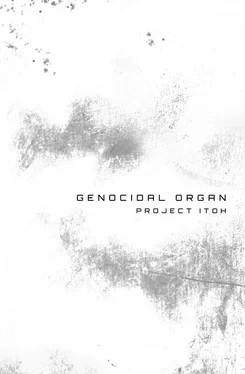Project Itoh - Genocidal Organ
Здесь есть возможность читать онлайн «Project Itoh - Genocidal Organ» весь текст электронной книги совершенно бесплатно (целиком полную версию без сокращений). В некоторых случаях можно слушать аудио, скачать через торрент в формате fb2 и присутствует краткое содержание. Год выпуска: 2012, ISBN: 2012, Издательство: Haikasoru/VIZ Media, Жанр: Старинная литература, на английском языке. Описание произведения, (предисловие) а так же отзывы посетителей доступны на портале библиотеки ЛибКат.
- Название:Genocidal Organ
- Автор:
- Издательство:Haikasoru/VIZ Media
- Жанр:
- Год:2012
- ISBN:9781421550886
- Рейтинг книги:4 / 5. Голосов: 1
-
Избранное:Добавить в избранное
- Отзывы:
-
Ваша оценка:
- 80
- 1
- 2
- 3
- 4
- 5
Genocidal Organ: краткое содержание, описание и аннотация
Предлагаем к чтению аннотацию, описание, краткое содержание или предисловие (зависит от того, что написал сам автор книги «Genocidal Organ»). Если вы не нашли необходимую информацию о книге — напишите в комментариях, мы постараемся отыскать её.
Genocidal Organ — читать онлайн бесплатно полную книгу (весь текст) целиком
Ниже представлен текст книги, разбитый по страницам. Система сохранения места последней прочитанной страницы, позволяет с удобством читать онлайн бесплатно книгу «Genocidal Organ», без необходимости каждый раз заново искать на чём Вы остановились. Поставьте закладку, и сможете в любой момент перейти на страницу, на которой закончили чтение.
Интервал:
Закладка:
I asked my question of the counselor during the battle preparations that Colonel Rockwell had ordered on the last day of our BEAR neurotreatment—Battle Emotion Adaptive Regulation. The core members of the battle plan were lined up in the offices of a Viennese School clinical psychologist having our mental states adjusted. We had all received sensitivity maskers, local anesthesia to our frontal lobes, and extensive counseling, and now the psychological barriers to optimum performance on the battlefield were reduced to the minimum. We were getting ready to fight.
Special Forces were all subjected to these treatments every time they went into battle. Well, of course we were: we were the elite, the best of the best, so why shouldn’t we use every means at our disposal to maximize our battlefield performance? It was just a series of standard medical procedures after all. And yet, even though I’d undergone the procedure countless times without incident, there was always a lingering doubt, and that was now starting to press on me.
“Without a shadow of a doubt?” I repeated.
The counselor nodded. “Absolutely. It’s a wonderful thing for an emerging young mind to spend time carefully analyzing itself, but out in the real world you soon realize that you simply don’t have time to spare second-guessing yourself.”
He stopped and paused for words, then took a breath and continued. “Think about when you last caught a bad cold. Did you perhaps see a doctor, who prescribed some medicine and gave you advice? You then got some bed rest, took it easy for a couple of days. Now. A question for you, Mr. Shepherd. Who was it who actually cured your cold?”
“I don’t know.” I didn’t want to give a stupid answer and have this young counselor laugh at me.
He pointed theatrically at my chest. “It was you, Captain. You, not the doctor. Your body fought off the infection, but more importantly, it was you who decided to find a cure. You were the one who went to see the doctor, to ask for a prescription. It was your intention, your will, your purpose. The doctor, and the medicine he gave you, were just there to help. People are allowed to use tools in order to help achieve their objectives, are they not? Well, that’s what your frontal lobe masking and counseling sessions are: tools. After all, you were the one who decided that you would fight, long before you first came to us for treatment.”
The counselor was right. What would be the point of deciding to fight in a traumatic theater of war and then choosing voluntarily to experience that trauma, with all its attendant side effects, when there was perfectly good preventive treatment available?
“What we counselors do is regulate your emotions so that they are at their most appropriate for war. You wouldn’t want any ethical noise to creep into your consciousness during the heat of battle—it could result in a split-second delay with lethal consequences for you or your comrades. That’s why we have these mechanisms to filter the world so that your brain receives it in a way that allows it to process information efficiently. That’s all that happens when the frontal lobe module of your brain is masked and you receive your counseling.”
Ethical noise. It was true that the battlefield was neither the time nor the place to be meditating on ethical dilemmas. Emotions were shortcuts to value judgments, whereas working through dilemmas using reason took time and effort. If a person had no values and relied solely on cold hard reason, he would never be able to decide anything. Pushed through to its logical conclusion, a supremely rational being would necessarily take every single little factor into consideration and end up being paralyzed by inertia.
Humans weren’t the same as wild beasts, though. We had to decide who needed to be killed and who needed only to be wounded. A bear could kill, all right, but only humans had the capacity to truly fight. To choose to neutralize the enemy not from base instinct but out of free will.
“Your actions and thoughts derive from a network of extensive modules in your brain. You subconsciously refer to an internal library of judgments and actions. This is true of your conscience. Your nervous system is hardwired to favor cooperation with other people that will mutually enhance your lives and therefore your chances of survival. Well, this conscience manifests itself physically inside your brain. It has a specific set of coordinates.”
“A module?” I asked, and the counselor smiled.
But I already knew all this. How the brain worked. And how unreliable our own sense of self was.
I kept it all pent up inside me, though, and listened to the counselor’s continued explanation.
“Exactly. It’s the same principle as the sensory masking that we use for Special Forces. I’m sure it must be quite unusual at first to have the feeling of pain masked so that only the knowledge of it remains.”
Sensory masking. That grotesque form of preemptive battlefield anesthesia invented by DARPA. It took away any feelings of pain from wounds received on the battlefield so that the soldier could fight on unhindered while at the same time being fully aware of the fact that he had been hurt, so that he could tend to his injuries as appropriate. This bizarre disconnect was only possible because the acts of acknowledging pain and feeling pain occurred in different modules of the brain.
“In other words, if we mask the correct combination of the brains modules, we can do more than just suppress pain. We can also give the person certain behavioral characteristics that will help him succeed in his mission. Despite all the advances in neuroscience, our detailed knowledge of the inner workings of modules is still really only in its infancy, so we’re not able to make precise adjustments, but we can at least do enough to ensure that our heroes in Special Forces aren’t weighed down by an unnecessary emotional burden during battle.”
His explanation of the brain’s inner workings was just the same as the explanation that I had received that summer, in that hospital, back when I chose to kill my mother.

There were forty or fifty cross-sections of my mother’s brain on display in the examining room. The slides were all in square frames, neatly covering the wall, so that from a distance they almost looked like they were a single giant slab of marble.
“So she’s not conscious?” I asked, or rather confirmed, for the umpteenth time. Looking back now, I can’t remember the exact number of times I posed a variation of this question. But it must have been a considerable number. It took me a lot of time and effort to accept that the question itself was flawed, and even after I came round to that fact, I was still never confident in my newfound understanding.
The doctor looked at the slides again and closed his mouth while he was thinking. Eventually, he opened it again.
“Mr. Shepherd. Are you a religious man?”
“No.”
“Well, no matter—even if you were religious, this would still require some explanation,” the doctor said. “It’s true that we used to believe that consciousness was a two-way state: at any given time, a person was either conscious or not. Sleep was, after all, the dominant paradigm and our main frame of reference.”
“Well, yes, people fall unconscious and sleep,” I said, without adding the unspoken third option that they die. “Are you saying that there are other states?”
There were, the doctor told me, and then began explaining some of the developments in neuroscience over the past ten years. He explained how advances in mapping techniques had allowed medical science to identify which mental processes happened in which parts of the brain, and that so far a total of 572 discrete modules had been identified.
Читать дальшеИнтервал:
Закладка:
Похожие книги на «Genocidal Organ»
Представляем Вашему вниманию похожие книги на «Genocidal Organ» списком для выбора. Мы отобрали схожую по названию и смыслу литературу в надежде предоставить читателям больше вариантов отыскать новые, интересные, ещё непрочитанные произведения.
Обсуждение, отзывы о книге «Genocidal Organ» и просто собственные мнения читателей. Оставьте ваши комментарии, напишите, что Вы думаете о произведении, его смысле или главных героях. Укажите что конкретно понравилось, а что нет, и почему Вы так считаете.












